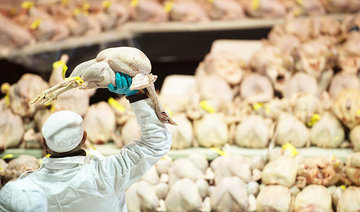JEDDAH: World Wildlife Day has arrived and all eyes are on animals native to Saudi Arabia.
Familiar to many is the Kingdom’s national animal, the Arabian camel, as well as the world-renowned Arabian horse, celebrated for its striking beauty, elegance and intelligence. Today, however, two animals will be showcased and they are seldom seen in Saudi Arabia, partly due to their nocturnal habits but mainly due to their endangered status.
MEET THE SAND CAT
Do not let this cute domestic-looking feline fool you — this is a predatory carnivorous wildcat.
Predominantly found in the western part of Saudi Arabia, sand cats are the only species of the cat family to live exclusively in the desert. They can weigh between 5-8lb and reach lengths of 2-3ft. From hot sunny days to cold windy nights, they adapt well to the extreme weather changes found in the desert. Their feet are covered with a thick coat of hair insulating their paws from hot and cold temperatures. Their padded paws also allow them to walk on the sand without sinking, leaving footprints that are nearly untraceable.
A defense mechanism of crouching down and shutting their eyes when a light is shone on them is common, which prevents light reflecting from their eyes and hinders being tracked by larger predatory animals. Sand cats are primarily nocturnal hunters, silently roaming the desert for prey.
National Wildlife Research Center (NWRC) Director Ahmed Al-Bourg spoke to Arab News about the importance of improving animal conservation.
“NWRC is working on awareness campaigns to educate citizens and residents alike about the importance of these species in our system, and how they play a vital role in our environmental balance,” he said. “NWRC has 15 animal sanctuaries and wildlife reserves in the Kingdom, including three marine reserves.”
The sand cat has had a revival in numbers of late. It is currently categorized as of “least concern” by the International Union for Conservation of Nature (IUCN) after being endangered for the past couple of decades, especially during the Gulf War when their livelihood and habitats were greatly impacted.
During the Gulf War the Saudi government sent eight sand cats to S.O.S. Care, an international California-based conservation organization, in an effort to preserve the species, which has proved highly successful.
National Geographic photojournalist Steve Winter highlighted the importance of conservation efforts for endangered animals, specifically big cats such as the Arabian leopard.
In a statement to Arab News, he said: “Everybody loves big cats, and the land in which they live is vitally important to us as humans. You save the top predator in any ecosystem, you save everything underneath that, which means the land they live on also. If we can rally around them, and try to save them, we can help save ourselves.”
THE ARABIAN WOLF
Another animal not often seen in the Kingdom is the Arabian wolf. The Arabian wolf is a smaller sub-species of the gray wolf, and like the sand cat is predominately nocturnal. Most Arabian wolves can be found roaming the mountainous desert regions of Najd and Tabuk. The weight of an Arabian wolf averages 25kg (55lb) and their length can reach up to 5ft.
Unlike the majority of wolves, the Arabian wolf does not hunt in packs but rather alone or in pairs. Arabian wolves will attack and eat any animal the size of a goat or smaller, most often small- to medium-sized prey such as rodents, rabbits, small gazelles and small ibexes. Occasionally they will feed on carrion and livestock when near human settlements.
Since they occasionally prey on farm animals such as sheep, goats and chickens, livestock owners often set traps for the wolves and even hunt them to protect their livelihood. Habitat loss from industry and intensive agriculture has also become a significant threat to the wolf.
There are an estimated 2,000 to 3,000 Arabian wolves left in the wild and they are currently categorized as “endangered” by the IUCN.
Today is World Wildlife Day, a day to remember the beautiful animals that share our land. The sand cat and the Arabian wolf are just two of the many species facing the threat of extinction. They are out there in the wild and often out of sight, but with the right conservation efforts, not out of mind.




































